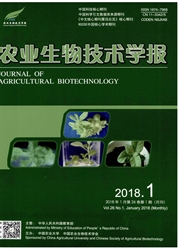

 中文摘要:
中文摘要:
黄芩苷(baicalin)具有清热镇静、抑菌抗炎等作用,通过不同浓度黄芩苷对热应激下睾丸支持细胞(sertoli cells,SCs)表达胶质细胞源性神经生长因子(glial cell line-derived neurotrophic factor,GDNF)和干细胞因子(stem cell factor,SCF)的影响,探讨黄芩苷是否可以通过提高SCs的耐热性保护细胞,提高SCF与GDNF的表达.采用二步酶消化法分离犊牛Bos taurus)睾丸组织获得SCs,4h差速贴壁纯化,分别采用RT-PCR鉴定标志性基因GDNF和SCF的表达,福尔根染色鉴定细胞形态.选用第3代对数生长期的SCs,通过噻唑蓝(methyl thiazoletetrazolium,MTT)筛选黄芩苷安全使用浓度;设对照组(37℃)、42℃单纯热应激组和42℃热应激加黄芩苷(0.1,1,10和20 μg/mL)组;用MTT检测细胞存活率,提取各组细胞总RNA和总蛋白,分别用实时荧光定量PCR(Real-time quantitative PCR,qRT-PCR)和酶联免疫吸附测定(enzyme linked immunosorbent assay,ELISA)检测GDNF和SCF mRNA及其蛋白的表达.结果显示,第3代原代细胞生长良好,RT-PCR检测可见GDNF和SCF mRNA表达,福尔根染色显示有卫星核小体存在,表明分离培养的细胞为SCs.对第3代SCs进行热应激处理,与对照组(37℃)比较,42℃单纯热应激组细胞存活率极显著(P<0.01)下降,GDNF和SCF mRNA(P<0.01)与蛋白(P<0.05)的表达也降低.与42℃单纯热应激组比较,用浓度为1 μg/mL (P<0.05)和10 μg/mL(P<0.01)黄芩苷作用细胞的存活率升高;浓度在0.1~20 μg/mL黄芩苷作用的细胞,其GDNF和SCF mRNA的表达量均极显著(P<0.01)高于42℃单纯热应激组,而在黄芩苷浓度为1 μg/mL时,SCF(P<0.01)和GDNF(P<0.05)蛋白表达量高于42 ℃单纯热应激组,并且基因和蛋白的表达量随着黄芩苷浓度的增加呈现先上升后下降的趋势.结果表明,黄芩苷能提高热应激下SCs的存活率以及GDNF和SCF的表达量.本实验从分子水平研究黄芩苷对SCs的抗
 英文摘要:
英文摘要:
Baicalin has many beneficial effects clinically such as heat-clearing bacteriostasis and anti- inflammatory. Its effects on improving the heat resistance of bovine(Bos taurus) sertoli cells(SCs) were studied by measuring expressions of glial cell line-derived neurotrophic factor(GDNF) and stem cell factor (SCF) of SCs treated with different concentrations of baicalin. CoUagenase and typsin were sequentially used to separate SCs from calf testis, and then the differential adhesion method was used to purify the SCs(4 h). The obtained SCs were cultured in vitro and their GDNF and SCF mRNA expressions and satellite karyosomes were identified by RT-PCR and Feulgen staining, respectively. The SCs of logarithmic phase growth were selected and divided into different groups including control group(37 ℃), 42 ℃ heat stress group and 42 ℃ heat stress plus baicalin(0.1, 1, 10 and 20 I-tg/mL) treated group. The cell survival rate was observed with methyl thiazoletetrazolium(MTT) assay. The Real-time quantitative(qRT-PCR) and enzyme linked irnmunosorbent assay(ELISA) results showed that both marker genes of GDNF and SCF and special satellite karyosomes in SCs were all detected. The cell survival rate(P〈0.01) and the expressions of GDNF and SCF mRNA(P〈0.01) and protein(P〈0.05) reduced in the SCs in 42 ℃ heat stress group compared with the control group(37 ℃). However, compared with 42 ℃ heat stress group, the cell survival rates in the heat stress group treated with 1 lag/mL(P〈0.05) and 10 μg/mL(P〈0.01) of baicalin increased; the expressions of GDNF and SCF mRNA in the 42 ℃ heat group treated with 0.1~20 μg/mL baicalin very significantly(P〈0.01) increased, and so did the protein expressions of SCF(P〈0.01) and GDNF(P〈0.05) with 1 μg/mL baicalin, respectively. The results indicated that baicalin increased SCs survival rate under heat stress and improved mRNA and protein expressions of both SCF and GDNF. The present resear
 同期刊论文项目
同期刊论文项目
 同项目期刊论文
同项目期刊论文
 Saikosaponin-D Attenuates Heat Stress-Induced Oxidative Damage in LLC-PK1 Cells by Increasing the Ex
Saikosaponin-D Attenuates Heat Stress-Induced Oxidative Damage in LLC-PK1 Cells by Increasing the Ex 期刊信息
期刊信息
